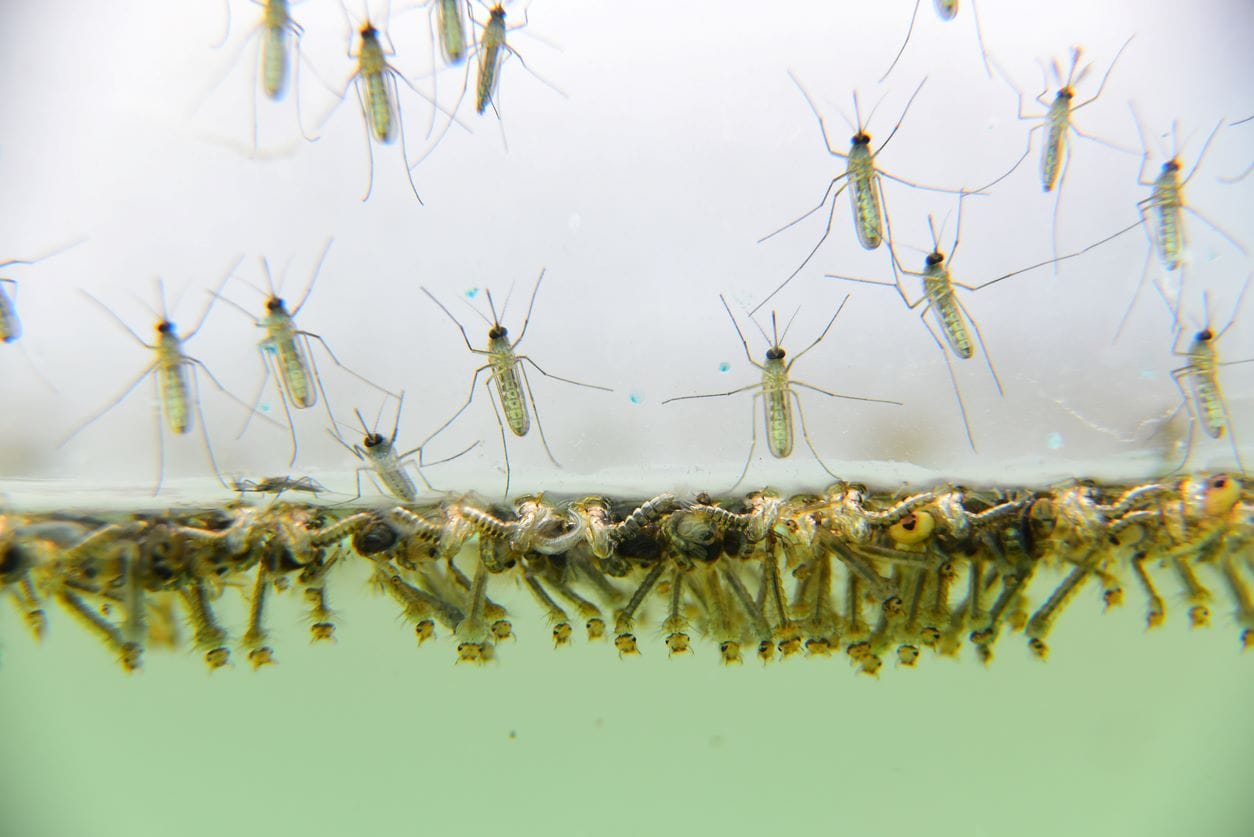How Long Do Mosquitoes Live? Unveiling Their Lifespan

Mosquitoes typically live for about two to three weeks. Despite their short lifespan, they can quickly multiply and become a nuisance to humans and animals alike.
Female mosquitoes require a blood meal in order to lay eggs, which can lead to the spread of diseases such as malaria, dengue fever, and Zika virus. Mosquitoes are found in various habitats, including standing water and areas with high humidity.
In this blog, we will explore the lifespan of mosquitoes, their habitat, and ways to prevent their breeding in order to protect ourselves from the diseases they carry.
Introduction To Mosquito Lifespan
Mosquitoes have a relatively short lifespan, typically living for about 2 weeks to a month. Factors like species, environment, and gender influence their longevity. Understanding mosquito lifespan is crucial in effective pest control strategies.
Mosquitoes are a pesky nuisance that can disrupt our outdoor activities and pose health risks. Understanding their lifespan is crucial in devising effective strategies for mosquito control. The lifespan of a mosquito varies depending on various factors, including environmental conditions, species, and gender. In this blog post, we will explore the factors that influence mosquito longevity and compare the average lifespan of male and female mosquitoes.
Factors Influencing Mosquito Longevity
Several factors can influence how long mosquitoes live. These factors play a significant role in determining the lifespan of these tiny insects:
- Species: Different mosquito species have varying lifespans. For example, the average lifespan of an Aedes mosquito is around two weeks, while some Culex species can live up to a month.
- Environmental Conditions: Mosquitoes thrive in warm and humid environments. The availability of standing water for breeding, temperature, and humidity levels can impact their lifespan.
- Food Availability: Mosquitoes primarily feed on nectar and plant juices, but females require blood meals for reproduction. The availability of food sources affects their overall health and longevity.
- Predators and Diseases: Mosquitoes have natural predators, such as dragonflies, birds, and bats, which can significantly reduce their lifespan. Additionally, mosquito-borne diseases can also shorten their lifespan.
- Genetics: Genetic factors can influence mosquito lifespan. Some individuals may have genetic variations that make them more resistant to diseases or better suited for survival.
Average Lifespan: Male Vs. Female
When it comes to mosquito lifespan, there is a notable difference between males and females. Here’s a comparison of their average lifespans:
| Gender | Average Lifespan |
|---|---|
| Male | Around one to two weeks |
| Female | Around two to four weeks |
Female mosquitoes generally live longer than males because they require blood meals for egg production. Males, on the other hand, primarily feed on nectar and do not engage in reproductive activities. It is important to note that these average lifespans can vary depending on the species and environmental conditions.
Understanding the factors influencing mosquito longevity and the differences between male and female lifespans can help in developing effective mosquito control measures and minimizing their impact on human populations.
Mosquito Birth And Early Development
Mosquito birth and early development play a crucial role in understanding the life cycle of these pesky insects. From the moment they hatch as eggs to their transition into adulthood, the stages of a mosquito’s early life are fascinating and essential for controlling their population.
From Eggs To Larvae
Mosquito eggs are typically laid in standing water, where they hatch within 24 to 48 hours. The larvae, often referred to as wrigglers, emerge from the eggs and live in water, where they feed on organic matter and develop over the course of about 4 to 14 days.
The Pupal Stage: Transition To Adulthood
After the larval stage, mosquitoes enter the pupal stage, during which they transform into their adult form. This stage usually lasts for about 2 to 4 days before the adult mosquito emerges from the water.
The Adult Stage Of Mosquitoes
Understanding the lifespan of mosquitoes is crucial in managing their population and preventing the spread of diseases they carry. In this blog post, we will focus on the adult stage of mosquitoes, delving into their final transformation and behavioral patterns. By gaining insight into these aspects, we can better comprehend their life cycle and develop effective strategies for mosquito control.
Emerging As Adults: The Final Transformation
After progressing through the egg and larval stages, mosquitoes eventually reach the adult stage, where they undergo their final transformation. This remarkable metamorphosis takes place in the pupal stage, which is often spent in water. Inside the pupa, the mosquito undergoes a series of changes, including the development of wings, legs, and other adult features.
Once the transformation is complete, the adult mosquito emerges from the pupa and floats on the water’s surface. During this vulnerable period, the mosquito’s wings need time to dry and harden before it can take flight. This process typically lasts a few hours, after which the mosquito is ready to begin its adult life.
Behavioral Patterns Of Adult Mosquitoes
Adult mosquitoes exhibit various behavioral patterns that are essential for their survival and reproduction. Understanding these patterns can help us implement effective mosquito control measures.
1. Feeding Habits: Female mosquitoes require a blood meal to develop and nourish their eggs. They are equipped with specialized mouthparts that allow them to pierce the skin of animals or humans. Male mosquitoes, on the other hand, feed on nectar and other plant juices.
2. Resting Behavior: Mosquitoes often seek shelter in cool and dark areas during the day to avoid extreme temperatures and dehydration. Common resting places include vegetation, tree canopies, and indoor spaces.
3. Flight Patterns: Mosquitoes are adept fliers, capable of flying up to several miles in search of suitable breeding sites, hosts for blood meals, and resting places. They are attracted to carbon dioxide, heat, and certain chemicals emitted by animals and humans.
4. Mating Rituals: Male mosquitoes use their wings to produce a characteristic buzzing sound, attracting females for mating. Once mated, females store sperm for future fertilization of eggs.
5. Lifespan: The lifespan of adult mosquitoes varies depending on the species, environmental conditions, and availability of resources. While some species may live for a few weeks, others can survive for several months.
By understanding the adult stage of mosquitoes and their behavioral patterns, we can develop targeted strategies to reduce their population and minimize the risk of mosquito-borne diseases. Effective mosquito control involves implementing measures to disrupt their breeding sites, using repellents, and adopting personal protection methods to prevent mosquito bites.

Credit: www.cleggs.com
Dietary Habits And Lifespan
Mosquitoes have a diverse diet that plays a crucial role in determining their lifespan. Understanding the dietary habits of these pesky insects provides valuable insight into their biology and behavior.
Blood-feeding And Female Mosquitoes
Female mosquitoes are notorious for their blood-feeding habits, as they require the proteins found in blood to develop and lay eggs. This behavior is directly linked to their lifespan, as females live for about two to three weeks after their first blood meal.
Nectar And Water: Sustenance For Males
Male mosquitoes, on the other hand, primarily feed on nectar and water. This sustenance allows them to survive for approximately one to two weeks, considerably shorter than their female counterparts.
Environmental Impact On Mosquito Lifespan
Mosquitoes are small but mighty creatures that can have a significant impact on our lives. Understanding the factors that influence their lifespan is crucial for effective mosquito control. In this section, we will explore the environmental factors that play a role in the lifespan of mosquitoes.
Temperature And Humidity Effects
The temperature and humidity levels in the environment have a direct impact on the lifespan of mosquitoes. Mosquitoes thrive in warm and humid conditions, as these conditions provide ideal breeding and development grounds.
High temperatures can accelerate the mosquito’s life cycle, leading to faster maturation and a shorter lifespan. On the other hand, extreme cold temperatures can significantly reduce their lifespan and reproductive capabilities.
Humidity also plays a vital role in mosquito survival. Mosquitoes require water for breeding, and high humidity levels contribute to the availability of suitable breeding sites. Additionally, high humidity helps maintain the moisture necessary for mosquito eggs to hatch and larvae to develop.
Predation And Natural Threats
Mosquitoes face various natural threats in their environment, which can impact their lifespan. Predators such as birds, bats, dragonflies, and certain fish species feed on mosquitoes at different stages of their life cycle.
These predators act as natural control agents, reducing the mosquito population and thus impacting their lifespan. The presence of predators can create a hostile environment for mosquitoes, forcing them to alter their behavior, breeding patterns, and feeding habits.
In addition to predation, other natural threats like parasites and diseases also affect mosquito lifespan. Mosquitoes can become hosts for pathogens such as malaria, dengue, Zika virus, and West Nile virus, which can significantly reduce their lifespan.
By understanding the environmental factors that influence mosquito lifespan, we can implement effective strategies for mosquito control. Maintaining suitable temperature and humidity levels and promoting the presence of natural predators can help reduce mosquito populations and minimize their impact on human health.

Credit: nadamosquito.com
Human Intervention And Mosquito Control
Mosquitoes are a persistent nuisance, but human intervention and mosquito control strategies have proven effective in managing their populations. Understanding the lifespan of mosquitoes is crucial in developing successful intervention methods to limit their impact on human health and well-being.
Pesticides: Lifespan Reducers
Pesticides play a vital role in reducing the lifespan of mosquitoes. By targeting mosquito breeding grounds with larvicides, we can disrupt the development of mosquito larvae, effectively reducing the number of adult mosquitoes that emerge. Additionally, adulticides are used to directly target and eliminate adult mosquitoes, further decreasing their lifespan and population. It’s important to use these chemicals judiciously to minimize environmental impact.
Mosquito Management Strategies
Implementing integrated mosquito management strategies is crucial for controlling mosquito populations. These strategies encompass a variety of approaches, including habitat modification, biological control, and community education. Habitat modification involves removing or altering mosquito breeding sites, while biological control methods use natural predators or pathogens to limit mosquito populations. Community education plays a significant role in encouraging individuals to eliminate standing water and take preventive measures to reduce mosquito breeding opportunities.
Disease And Mosquito Mortality
Mosquitoes have a short lifespan, usually living up to a few weeks. However, factors like climate and predators can influence their mortality rate. Diseases can also impact mosquito populations, affecting how long they live.
Pathogens Carried By Mosquitoes
Disease and Mosquito Mortality Mosquitoes play a crucial role in disease transmission, carrying pathogens that pose significant health risks. These tiny insects can harbor various deadly viruses and parasites.
Impact Of Diseases On Mosquito Populations
The diseases carried by mosquitoes can have a profound impact on their populations. Outbreaks of diseases can lead to high mortality rates among mosquito populations.
| Disease | Impact on Mosquitoes |
|---|---|
| Malaria | Reduces lifespan |
| Dengue Fever | Decreases breeding success |
- Malaria reduces mosquito lifespan.
- Dengue Fever decreases breeding success.
Research And Future Prospects
Mosquitoes have long been a nuisance to humans, but ongoing research is shedding light on their lifespan and potential for control.
Genetic Studies And Lifespan
Genetic studies are unraveling the secrets behind mosquitoes’ longevity, leading to new insights into their lifespan.
Developing Longer-lasting Mosquito Control
Scientists are working tirelessly to develop innovative methods for longer-lasting mosquito control to combat diseases they transmit.
Frequently Asked Questions
How Long Do Mosquitoes Live?
Mosquitoes have an average lifespan of about 2 to 3 weeks. However, the lifespan of mosquitoes can vary depending on the species, environmental factors, and availability of resources.
How Do Mosquitoes Reproduce?
Mosquitoes reproduce by laying eggs in stagnant water. Female mosquitoes can lay up to 300 eggs at a time. The eggs hatch into larvae, which develop into pupae, and then emerge as adult mosquitoes.
What Diseases Do Mosquitoes Carry?
Mosquitoes are known to carry and transmit several diseases, including malaria, dengue fever, Zika virus, and West Nile virus. It is important to take measures to prevent mosquito bites to reduce the risk of contracting these diseases.
How Do I Prevent Mosquito Bites?
You can prevent mosquito bites by wearing long-sleeved clothing, using insect repellent, and eliminating standing water around your home. Installing screens on windows and doors can also help keep mosquitoes out of your living space.
Conclusion
Understanding the lifespan of mosquitoes helps in effective control measures. By knowing their life cycle, we can prevent breeding grounds. Mosquitoes live for about 2 weeks to a month, varying by species. Implementing preventive strategies can reduce their populations and minimize the risk of diseases they transmit.



